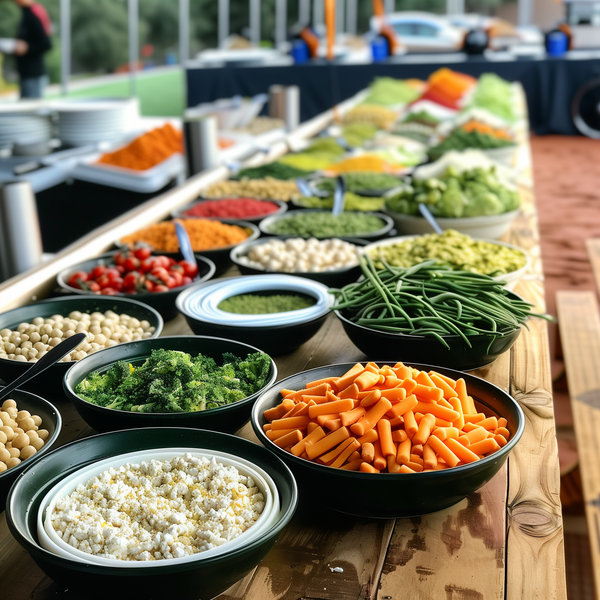
The Importance of Fiber in a Balanced Diet for Athletes
So, you're all about hitting your peak performance, right? But there’s this underrated player in the nutrition game you might not be giving enough credit: dietary fiber. Yeah, that stuff your granny always talks about for keeping things moving. Turns out, it’s pretty darn essential for athletes, too, and lots of us aren’t getting our fill. Let’s dive into why fiber is the secret ingredient to nailing those athletic goals.

Fiber 101: What’s the Deal?
Fiber is that tough guy in the carb family your body can’t break down. It comes in two types: soluble (which gets all cozy and gel-like in your stomach) and insoluble (the part that keeps your bowel movements top-notch). Both types are key for a happy gut, but they don’t stop there.
Why Fiber Deserves a High Five
- Keeps the Tummy Happy: A smooth-running digestive system means your body can focus on absorbing the good stuff and ditching the waste—super important for keeping you in the game.
- Helps Keep You Lean: Fiber fills you up without filling you out, perfect for managing weight without feeling like you're on a diet.
- Energizer Bunny Effect: By slowing down sugar absorption, fiber helps dodge those dreaded mid-day crashes, keeping your energy levels steady.
- Long-term Health Perks: Packing your diet with fiber can also lower the risk of not-so-fun stuff like heart disease and diabetes, keeping you in action longer.
Where to Score Your Fiber
Stocking up on fiber doesn’t have to be boring. There’s a whole lineup of tasty options:
- Fruits: Think apples with the skin on, juicy berries, and bananas.
- Veggies: Load up on leafy greens, carrots, and sweet potatoes.
- Legumes: Beans and lentils are fiber powerhouses.
- Grains: Go for the whole-grain bread, quinoa, and oats.
- Nuts and Seeds: Almonds, chia, and flaxseeds are your friends.

And if you’re running the Aussie tracks and find it tough to chow down enough fiber from food alone, there are supplements like psyllium husk that can come to the rescue. Just give your doc or a sports nutritionist a shout before diving into the supplement game.
Top Tips for Fiber-Fueled Athletes
- The Magic Number: Gals should aim for 25 grams a day, and guys need about 38 grams. If you’re pushing your limits, you might even go a bit higher.
- Slow and Steady Wins the Race: Jumping into a high-fiber diet overnight can lead to some, uh, uncomfortable moments. Gradually up your intake to let your body adjust.
- Water is Your Best Mate: High-fiber and low water is a recipe for gut trouble. Keep hydrated to keep things moving smoothly.
- Timing is Everything: Big event or tough workout on the horizon? Maybe don’t go heavy on the fiber right before. Spread it out to avoid any mid-race surprises.

Fiber might not be the first thing on your mind when you’re looking to up your game, but it’s a game-changer for your health and performance. From nailing that energy balance to keeping your weight in check, it’s about time fiber got its moment in the spotlight. So, here’s to making fiber a key player in your nutrition playbook!
FAQ's
Q1: What's the big deal about dietary fiber for athletes?
Dietary fiber is crucial for athletes because it supports a healthy digestive system, helps manage weight, maintains energy levels by slowing down sugar absorption, and lowers the risk of chronic diseases. It's an underrated nutrition component that can significantly enhance athletic performance.
Q2: How much fiber should I be aiming for each day?
Women should aim for 25 grams of fiber per day, and men need about 38 grams. If you're highly active or pushing your limits, you might want to increase that amount slightly, but always consider how your body reacts to dietary changes.
Q3: What are some good sources of fiber for athletes?
Excellent fiber sources include fruits (like apples with skin, berries, and bananas), vegetables (such as leafy greens, carrots, and sweet potatoes), legumes (beans and lentils), whole grains (like whole-grain bread, quinoa, and oats), and nuts and seeds (almonds, chia, and flaxseeds). For those needing a fiber boost, supplements like psyllium husk can be an option, but consult a professional first.
Q4: Can jumping into a high-fiber diet have any side effects?
Yes, suddenly increasing your fiber intake can cause discomfort like bloating and gas. It's best to gradually increase your fiber intake to allow your digestive system to adjust. Also, ensuring adequate water intake is crucial to avoid digestive issues.
Q5: Should I consider fiber intake timing around workouts or competitions?
Absolutely. It's wise to moderate your fiber intake right before a big event or tough workout to avoid any digestive surprises. Spreading out your fiber consumption throughout the day can help maintain steady energy levels and ensure comfort during physical activities.

Leave a comment